The Thornburgh Memo was a U.S. Department of Justice memorandum prepared by then Attorney General Richard Thornburgh, on June 8, 1989. The memo declared that state ethics rules were not binding upon federal prosecutors. It asserted that any compliance with state ethical rules by federal prosecutors conducting government investigations was strictly voluntary.
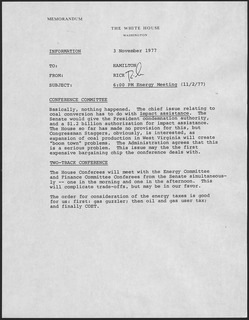
A memorandum is a written message that may be used in a business office. The plural form of the Latin noun memorandum so derived is properly memoranda, but if the word is deemed to have become a word of the English language, the plural memorandums, abbreviated to memos, may be used..
While the memo was not legally binding, it represented a dramatic statement of the then executive branch's understanding of its ethical obligations as lawyers.
When Janet Reno became Attorney General in 1993, the Justice Department backed away from the Thornburgh position. Instead, they promulgated the "Reno Rules," detailed in the Code of Federal Regulations. Those rules have since been supplanted by 28 U.S.C. § 530B, which provides:

Janet Wood Reno was an American lawyer who served as the Attorney General of the United States from 1993 until 2001. President Bill Clinton nominated Reno on February 11, 1993, and the Senate confirmed her the following month. She was the first woman to serve as Attorney General and the second-longest serving Attorney General in U.S. history, after William Wirt.
The Reno Rules were ethical rules for federal prosecutors promulgated in the Code of Federal Regulations by then Attorney General Janet Reno. The rules, despite their issuance, lacked statutory authority and were unenforceable. SeeUnited States v. McDonnell Douglas Corp., 132 F.3d 1252. The rules were passed in the wake of discussions about the Thornburgh Memo. They have since been supplanted by 28 U.S.C. § 530B.

The Code of Federal Regulations (CFR) is the codification of the general and permanent rules and regulations published in the Federal Register by the executive departments and agencies of the federal government of the United States. The CFR is divided into 50 titles that represent broad areas subject to federal regulation.
- "An attorney for the Government shall be subject to State laws and rules, and local Federal court rules, governing attorneys in each State where such attorney engages in that attorney's duties, to the same extent and in the same manner as other attorneys in that State."

The United States Attorney General (A.G.) is the chief lawyer of the federal government of the United States and head of the United States Department of Justice per 28 U.S.C. § 503, concerned with all legal affairs.
In most common law jurisdictions, the attorney general or attorney-general is the main legal advisor to the government. The plural is attorneys general (traditional) or attorney generals.
Freedom of information in the United States results from freedom of information legislation at the federal level and in the fifty states.
Legal ethics, principles of conduct that members of the legal profession are expected to observe in their practice. They are an outgrowth of the development of the legal profession itself.
In the United States, a special prosecutor is a lawyer appointed to investigate, and potentially prosecute, a particular case of suspected wrongdoing for which a conflict of interest exists for the usual prosecuting authority. Other jurisdictions have similar systems. For example, the investigation of an allegation against a sitting president or attorney general might be handled by a special prosecutor rather than by an ordinary prosecutor who would otherwise be in the position of investigating their own superior. Investigations into other persons connected to the government but not in a position of direct authority over the prosecutor, such as cabinet secretaries or election campaigns, have also been handled by special prosecutors.

A prosecutor is a legal representative of the prosecution in countries with either the common law adversarial system, or the civil law inquisitorial system. The prosecution is the legal party responsible for presenting the case in a criminal trial against an individual accused of breaking the law. Typically, the prosecutor represents the government in the case brought against the accused person.
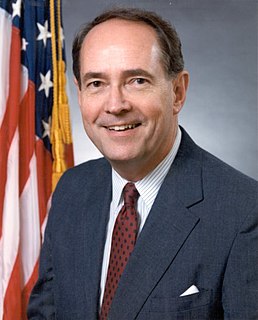
Richard Lewis Thornburgh is an American lawyer, author and Republican politician who served as the 41st Governor of Pennsylvania from 1979 to 1987, and then as the U.S. Attorney General from 1988 to 1991. Before his time as Attorney General and Governor, he worked in the office of the United States Attorney for the Western District of Pennsylvania.
The LaRouche criminal trials in the mid-1980s stemmed from federal and state investigations into the activities of American political activist Lyndon LaRouche and members of his movement. They were charged with conspiring to commit fraud and soliciting loans they had no intention of repaying. LaRouche and his supporters disputed the charges, claiming the trials were politically motivated.

Paul Joseph McNulty is an American attorney and university administrator who is currently the ninth president of Grove City College. He served as the Deputy Attorney General of the United States from March 17, 2006, to July 26, 2007. Prior to that, he was the U.S. Attorney for the Eastern District of Virginia.

William Pelham Barr is an American attorney who is the current United States Attorney General. Barr previously served in this position from 1991 to 1993 under the George H. W. Bush administration, and returned to the post in 2019 under the Trump administration. Before becoming attorney general the first time, Barr held numerous other posts within the U.S. Justice Department, including serving as Deputy Attorney General from 1990 to 1991 under George H. W. Bush. He is a member of the Republican Party. In March 2019, the Justice Department announced Barr won't recuse himself from oversight of a Russia investigation.
On December 7, 2006, the George W. Bush administration's Department of Justice ordered the midterm dismissal of seven United States Attorneys. Congressional investigations focused on whether the Department of Justice and the White House were using the U.S. Attorney positions for political advantage. Allegations were that some of the attorneys were targeted for dismissal to impede investigations of Republican politicians or that some were targeted for their failure to initiate investigations that would damage Democratic politicians or hamper Democratic-leaning voters.
The U.S. attorneys were replaced with interim appointees, under provisions in the 2005 USA PATRIOT Act reauthorization.
Steven M. Biskupic is a former U.S. Attorney for the Eastern District of Wisconsin serving under Attorneys General John Ashcroft, Alberto Gonzales and Michael Mukasey. He was appointed by George W. Bush in May 2002. Prior to his appointment, Biskupic served as an Assistant U.S. Attorney for 13 years, specializing in the prosecution of white-collar crime. Biskupic stepped down in 2008. He is now a partner at Michael Best & Friedrich in Milwaukee.
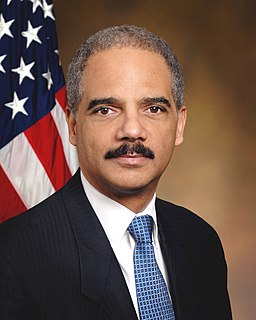
Eric Himpton Holder Jr. is an American lawyer who served as the 82nd Attorney General of the United States from 2009 to 2015. Holder, serving in the administration of President Barack Obama, was the first African American to hold the position of U.S. Attorney General.
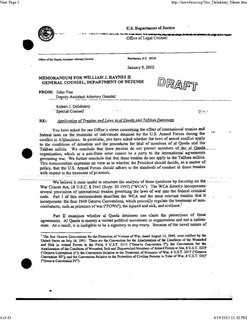
A set of legal memoranda known as the "Torture Memos" were drafted by John Yoo as Deputy Assistant Attorney General of the United States and signed in August 2002 by Assistant Attorney General Jay S. Bybee, head of the Office of Legal Counsel of the United States Department of Justice. They advised the Central Intelligence Agency, the United States Department of Defense, and the President on the use of enhanced interrogation techniques: mental and physical torment and coercion such as prolonged sleep deprivation, binding in stress positions, and waterboarding, and stated that such acts, widely regarded as torture, might be legally permissible under an expansive interpretation of presidential authority during the "War on Terror".
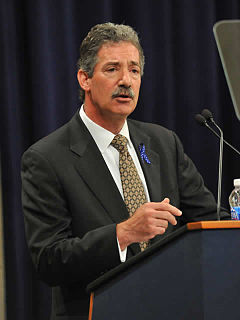
James Michael Cole is an American attorney who served as United States Deputy Attorney General from December 29, 2010 to January 8, 2015. He was first installed as Deputy Attorney General following a recess appointment by President Barack Obama on December 29, 2010. He then was confirmed by the United States Senate in a 55–42 vote on June 28, 2011.

Loretta Elizabeth Lynch is an American lawyer who served as the 83rd Attorney General of the United States from 2015 to 2017. She was appointed by President Barack Obama to succeed Eric Holder and previously served as the United States Attorney for the Eastern District of New York under both President Bill Clinton (1999–2001) and Barack Obama (2010–2015). As a U.S. Attorney, Lynch oversaw federal prosecutions in Brooklyn, Queens, Staten Island and Long Island.

Marijuana (cannabis) and the rights of individual states to legalize recreational and medical marijuana was an issue of President Donald Trump's presidential campaign, and he formally stated during his campaign that he believed states should have the right to manage their own policies with regard to medical and recreational marijuana. Following his election, he reversed his position on recreational marijuana and stated he believed medical marijuana should be allowed but stated the federal government may seek legal resolutions for those states which regulate the growth and sale of recreational marijuana.
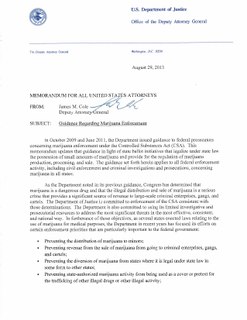
The Cole Memorandum was a United States Department of Justice memorandum issued August 29, 2013, by United States Deputy Attorney General James M. Cole during the presidency of Barack Obama. The memorandum, sent to all United States Attorneys, governed federal prosecution of offenses related to marijuana. The memo stated that given its limited resources, the Justice Department would not enforce federal marijuana prohibition in states that "legalized marijuana in some form and ... implemented strong and effective regulatory and enforcement systems to control the cultivation, distribution, sale, and possession of marijuana," except where a lack of federal enforcement would undermine federal priorities.













